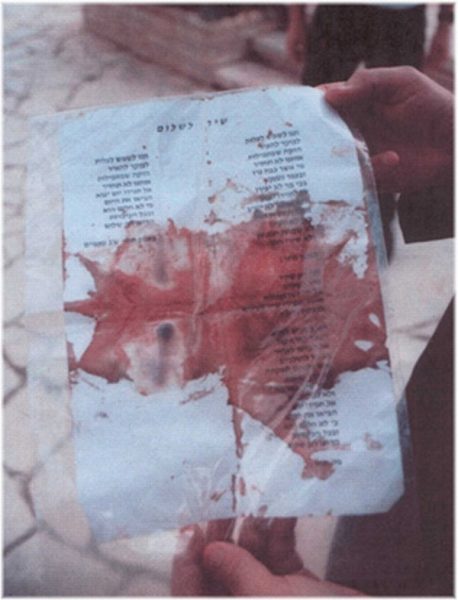Content warning: this article contains bloody imagery.
I was in grade school when Yigal Amir, a Zionist who objected to the Oslo Accords, assassinated Yitzhak Rabin, the Prime Minister and the highest-ranking Israeli military leader who confessed to the forceful removal of Palestinians from their homes in 1948, for signing agreements with the Palestinian Liberation Organization (PLO). During his trial, Amir claimed the murder was committed in self-defense because he believed peace with Palestinians would put Jewish lives at risk. This defense is often reflected in the statements of Israeli officials justifying the brutal military occupation of Palestine.┬Ā
I didnŌĆÖt understand much of what was going on at the time, but I remember news programs repeating the same two video clips: The first was of Rabin singing ŌĆ£Shir LaShalomŌĆØ (a ŌĆ£Song for PeaceŌĆØ) moments before he was assassinated. The second was the blood-stained copy of the songŌĆÖs lyrics found in his coat pocket. Someone scanned those blood-stained lyrics and public school teachers everywhere printed copies. We sang the song in music classes and memorial ceremonies, always referring to the blood-stained copy. I am still unsure what message they were trying to convey.

I know a lot of people who say that this anti-war movement is a threat to Jews because protesters use words like ŌĆ£IntifadaŌĆØ and ŌĆ£from the river to the sea.ŌĆØ You can try and tell them that Intifada means uprising, and that the Arab name for the Warsaw Ghetto Uprising is the Warsaw Intifada, but they wonŌĆÖt hear you. To them, Intifada means suicide bombers. You can explain that it was Zionists who first said from the river to the sea, but that also doesnŌĆÖt make a difference. TheyŌĆÖll respond that some Palestinians believe that the only path forward is to forcefully expel Jews, and that as Jews we should believe that they mean to do it. Not much time is spent deliberating on whether or not Zionists mean it when they say they will either expel or annihilate the Palestinians.┬Ā
At the foundation of a Zionist education is the trauma of the Russian Pogroms and the German Holocaust. Many of us are taught that the German Jews who didnŌĆÖt believe the words uttered by their German leaders were idiots. The conclusion that is repeated often and loudly: always take people at their word. ItŌĆÖs a dangerous lesson.
I was a teenager during the Second Intifada. The only map IŌĆÖve ever seen of Israel looked like this one. It was the entire land mass from the Jordan River to the Mediterranean Sea. I couldnŌĆÖt tell you where the West Bank was, but the news reports from the West Bank and Gaza were frequent. Every day Israeli viewers were shown footage of Palestinians saying they want to kill us. I remember one news report in which a Palestinian woman in her 60s wearing a hijab ran to the camera and spoke directly to the Israeli people saying: ŌĆ£We will kill all of you! We will all die, just to kill all of you!ŌĆØ┬Ā
To be honest, my focus was not on the womanŌĆÖs words because behind her was a huge pile of rubble, and I couldnŌĆÖt believe that just before the camera started rolling that pile of rubble was an apartment building. Did we really do this? I was wondering if everyone got out in time, or if people were buried there with all their belongings. I didnŌĆÖt believe that woman wanted to kill me. I believed she wanted her home back. Growing up I also didnŌĆÖt believe Israelis who chanted ŌĆ£Death to ArabsŌĆØ and spray painted walls in every city with that phrase. To me, they were angry and scared.┬Ā┬Ā
We canŌĆÖt de-escalate when we fixate on words spoken in anger. If weŌĆÖre conditioned to look for threats in every statement, we will live and die by our swords, or as Rabin said, ŌĆ£You donŌĆÖt make peace with friends, you make it with enemies.ŌĆØ┬Ā